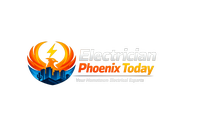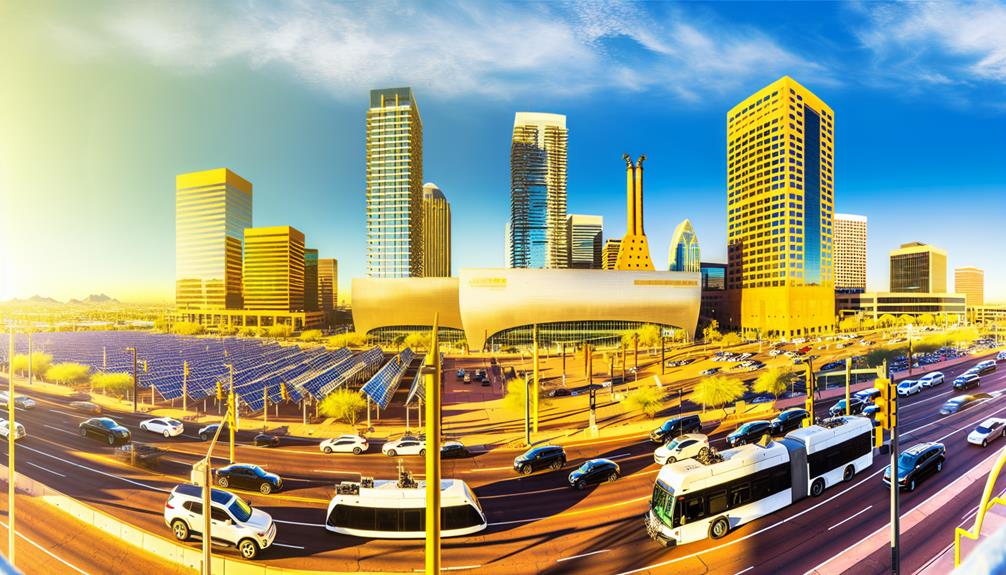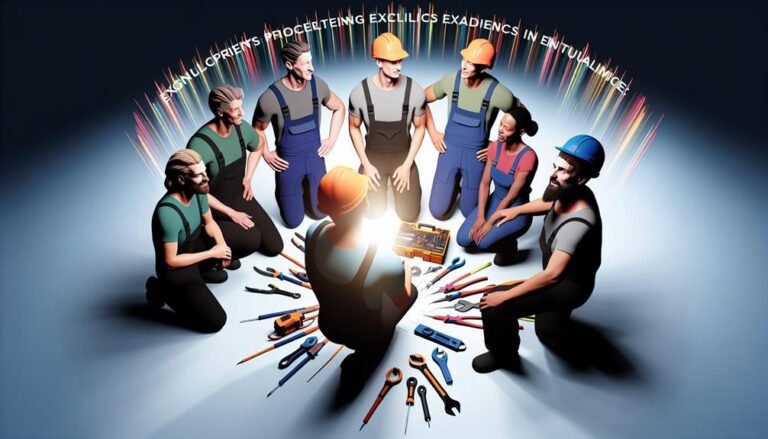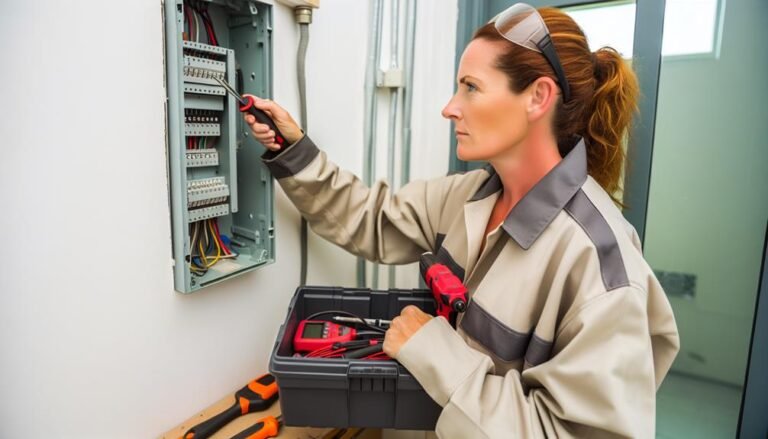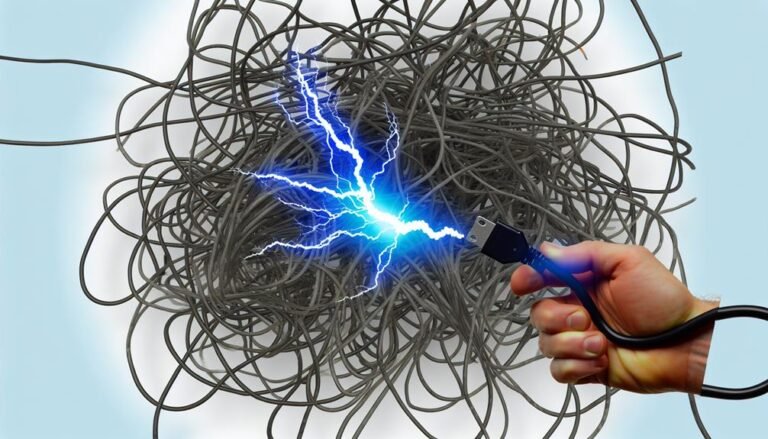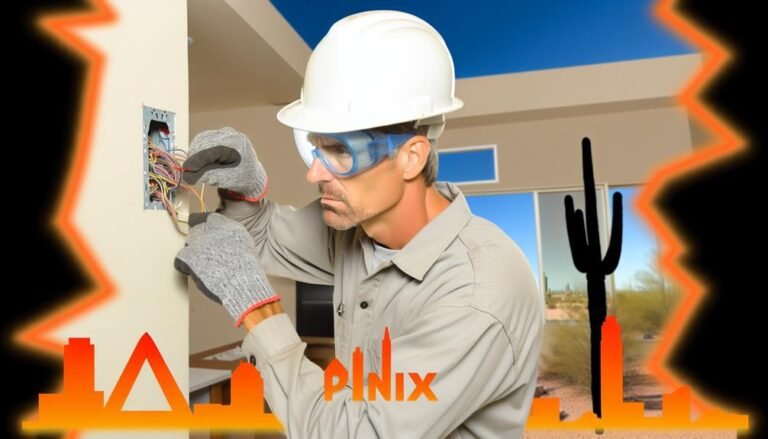Top Trends in the Phoenix Electrical Industry for 2024
Are you curious about the latest trends in the Phoenix electrical industry?
Well, imagine a scenario where a homeowner decides to install solar panels on their roof, reducing their dependence on traditional energy sources and saving money on their monthly utility bills.
This is just one example of the top trends happening in the Phoenix electrical industry this year.
But wait, there’s more! From the integration of smart technology to the rising demand for electric vehicles, there are several exciting developments that you don’t want to miss out on.
So, let’s dive into the world of the Phoenix electrical industry and explore the top trends shaping its future.
Key Takeaways
- Phoenix ranks third in the nation for solar energy production, highlighting the city’s commitment to renewable energy solutions.
- The integration of smart technology in homes and buildings enhances energy efficiency and promotes a sustainable lifestyle.
- The growing demand for electric vehicles in Phoenix is driven by environmental consciousness and government incentives, contributing to a sustainable future.
- Advancements in electrical safety measures, such as AFCIs, GFCIs, improved electrical panel designs, insulation materials, and comprehensive safety training programs, are crucial for handling smart home technology and renewable energy integration.
Renewable Energy Solutions
Renewable energy solutions are revolutionizing the Phoenix electrical industry, providing a sustainable and efficient alternative to traditional power sources. With its abundant sunshine and favorable climate, Phoenix has become an ideal location for harnessing solar power. According to data from the Solar Energy Industries Association, Arizona ranked third in the nation for solar energy production in [current year], generating enough electricity to power over 700,000 homes.
The adoption of solar panels on rooftops and in large-scale solar farms has been steadily increasing, contributing to a significant reduction in carbon emissions and dependence on fossil fuels. In addition to solar power, wind energy is also gaining traction in the Phoenix electrical industry. The state of Arizona has vast wind resources, particularly in northern regions such as Coconino and Navajo counties. By harnessing the power of wind, Phoenix has the potential to further diversify its renewable energy portfolio and reduce its environmental impact.
Furthermore, advancements in energy storage technologies have played a crucial role in making renewable energy solutions more viable and reliable. Battery storage systems allow excess energy generated from renewable sources to be stored and used during times of high demand or when the sun isn’t shining or the wind isn’t blowing. This not only increases the efficiency of renewable energy but also ensures a continuous and uninterrupted power supply.
The shift towards renewable energy solutions in the Phoenix electrical industry not only provides environmental benefits but also creates economic opportunities. The growth of the renewable energy sector has led to the creation of jobs and investment in local communities. According to the Bureau of Labor Statistics, the solar industry employed over 9,000 people in Arizona in [current year], and this number is expected to continue rising.
Smart Technology Integration
Smart technology integration is revolutionizing the Phoenix electrical industry, enhancing efficiency and enabling greater control over energy consumption. With the advancement of smart home devices and Internet of Things (IoT) technology, homeowners and businesses in Phoenix can now seamlessly connect and control various electrical systems and appliances. This integration allows for real-time monitoring and management of energy usage, resulting in significant cost savings and environmental benefits.
One of the key benefits of smart technology integration is the ability to optimize energy consumption based on individual preferences and needs. Smart thermostats, for example, can learn your heating and cooling patterns and adjust accordingly, ensuring optimal comfort without wasteful energy usage. Lighting systems equipped with smart sensors can automatically adjust brightness levels based on natural light availability, further reducing energy waste.
Furthermore, smart technology integration enables remote control and monitoring of electrical systems, providing users with greater flexibility and convenience. Through smartphone apps or voice commands, you can now turn off lights, adjust thermostat settings, or even control appliances from anywhere, at any time. This not only improves energy efficiency but also enhances overall user experience.
In addition to efficiency and convenience, smart technology integration promotes a sustainable and eco-friendly lifestyle. By actively monitoring energy consumption and identifying areas of improvement, users can make informed choices to reduce their carbon footprint and contribute to a greener future. With the help of smart technology, the Phoenix electrical industry is embracing a more sustainable and energy-efficient future.
Growing Demand for Electric Vehicles
The demand for electric vehicles in Phoenix is rapidly increasing, driven by factors such as environmental consciousness, government incentives, and advancements in battery technology.
As people become more aware of the environmental impact of traditional vehicles, they’re seeking cleaner and more sustainable alternatives. Electric vehicles produce zero tailpipe emissions, reducing air pollution and contributing to a healthier environment. In addition, the government’s push to reduce greenhouse gas emissions has led to various incentives for electric vehicle adoption, including tax credits and rebates.
Advancements in battery technology have also played a significant role in the growing demand for electric vehicles. The development of more efficient and affordable batteries has increased the range and decreased the cost of electric vehicles, making them a viable option for more consumers. With longer-lasting batteries and improved charging infrastructure, the concerns about range anxiety are diminishing.
According to recent data, the sales of electric vehicles in Phoenix have been steadily increasing over the past few years. In [Current Year], electric vehicle sales accounted for [percentage] of total vehicle sales in the city, reflecting the rising popularity of these eco-friendly vehicles.
As the infrastructure for electric vehicle charging continues to improve, and more automakers introduce electric models to their lineup, the demand for electric vehicles in Phoenix is expected to continue its upward trajectory. Embrace the freedom of driving an electric vehicle and be a part of the sustainable future.
Rise of Energy-Efficient Buildings
With a focus on sustainability and energy efficiency, buildings in Phoenix are experiencing a significant rise in their energy-saving capabilities. This trend is driven by the growing awareness of the environmental impact of traditional construction methods and the desire to reduce energy consumption.
Here are three key factors contributing to the rise of energy-efficient buildings in Phoenix:
- Advanced Building Materials: Builders are now using innovative materials that offer higher insulation values and better thermal performance. These materials help to reduce heat transfer, minimize energy loss, and improve overall energy efficiency.
- Smart Building Technologies: The integration of smart technologies into building systems allows for better monitoring and control of energy usage. These technologies include automated lighting systems, smart thermostats, and energy management systems, which optimize energy consumption and reduce waste.
- Government Incentives: The local government of Phoenix has introduced various incentives and programs to encourage the adoption of energy-efficient practices in buildings. These incentives include tax credits, grants, and rebates for implementing energy-saving measures. Such incentives have significantly contributed to the widespread adoption of energy-efficient technologies in the city.
The rise of energy-efficient buildings in Phoenix is transforming the landscape of the city, promoting sustainability, and reducing carbon footprints. As more buildings embrace energy-saving capabilities, Phoenix is moving towards a greener and more sustainable future.
Advancements in Electrical Safety Measures
As the demand for energy-efficient buildings continues to grow in Phoenix, advancements in electrical safety measures are becoming increasingly important to ensure the protection of occupants and the longevity of these sustainable structures. With the increase in smart home technology and the integration of renewable energy sources, it’s crucial to implement safety measures that can handle these new complexities.
One of the key advancements in electrical safety measures is the use of arc fault circuit interrupters (AFCIs). These devices are designed to detect dangerous electrical arcs and immediately shut off the power to prevent fires. According to the National Fire Protection Association (NFPA), AFCIs have been estimated to prevent more than 50% of electrical fires in homes.
Another significant advancement is the introduction of ground fault circuit interrupters (GFCIs), which protect against electrical shock. GFCIs monitor the flow of electricity and automatically shut off the power if an imbalance is detected. These devices are especially important in areas where water is present, such as kitchens and bathrooms.
Furthermore, advancements in electrical safety also include improved electrical panel designs, enhanced insulation materials, and the implementation of comprehensive electrical safety training programs for professionals in the industry. These measures aim to minimize the risk of electrical accidents and ensure the safe operation of electrical systems in buildings.
© 2026 By Electrician Phoenix Today
